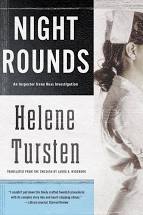Goodreads meta-data is 336 pages, rated 3.78 by 2817 litizens.
Genre: krimi
Verdict: meticiulous

Inspector Irene Huss is on the job after a nurse is murdered in a private hospital. This is the second instalment in the series following ‘Detective Inspector’ Huss (2004). As the police go to work the staff of the hospital, its owners, the medical consultants, patients and their visitors are questioned, and the interstices of the nineteenth century building are examined. Tursten knows this world well from her earlier career as a nurse.
What follow is a police procedural rich in the locale both the city of Göteborg and of the hospital. Its principal owner is the surgeon in chief, who has a trophy wife and the debts to prove it. It is February and the freezing rain becomes a pivotal character in the plot. When the temperature rises to freezing, it is cause for smiles, but when it rains and then freezes again, there are no more smiles but plenty of black ice.
There is a split among the nurses, some have been working at this hospital since it was owned by the surgeon’s father, and others are twenty year old contractors who come and go. The old guard nurses are loyal to the past, including its ghost, and the contractors just want to get paid. Ghosts or not, there are some haunted characters in this hospital of Otranto.
Even as Huss and the team investigate more murderers occur that may be related or may not. Along the way we see street people who have long since become non-persons to the social services, some faked qualifications that no one has the time or interest to check, and Huss herself is so preoccupied with things at home (two teenage children, a dog, and a husband in that order of priority) that she makes mistakes.
While her immediate superior tries hard, his roots are in the old school when women made the coffee and they show through, but Huss grits her teeth and bears it. Both that such sexism is present and that Huss ignores it, riles some GoodReads reviewers who qualify for the Snow Flake Award. Curiously one such writer condemns the books as easily forgotten and then dwells on this sexism in detail. It seems the writer both forgot the book and remembered it. Take that Aristotle, a thing can be itself and not at the same time. So much for the law of the excluded middle.
I have also read ‘Fire Dance’ (2014) and liked it.
